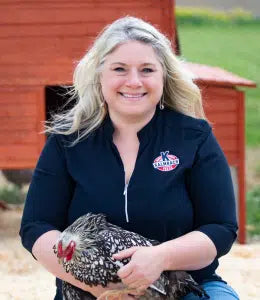How to Care For and Raise Backyard Ducks

Raising Ducks – Needs, Nutrition, and Benefits
When it comes to baby animals, it’s hard to find anything cuter than a baby duck. Those sweet little baby ducks can become VERY HARD TO RESIST when you start thinking about establishing or adding to your flock. Ducks are wonderful additions to any backyard flock but they do have a few unique requirements.
Rearing ducks is very similar to rearing chicks. Both require the same brooding temperatures, access to a high-quality starter/grower feed, and fresh water. Oh, the fresh water!!! Anyone who has raised baby ducks can tell you that water is their favorite thing. Since ducks are waterfowl, they are drawn to any water source they can find. In a brooder, that is usually their waterer. Baby ducks will splash and spill lots of water and this natural behavior means you will need to replace water and wet bedding more often.
Another unique feature of a duck is the way they use water to consume and digest their feed. If you have ever watched a duck eat and drink, they are different from chicks because they will dunk their entire beak – even their entire head if they have enough room – into their water source. Oftentimes, they will move between their feeder and their waterer while eating. Since their beak is wet, that moisture is transferred to their feed. Since their feed gets wet and sticky, they need to head back to the waterer to clean their beak! It’s a messy (but absolutely adorable) process.
Nutritional Requirement of Backyard Ducks
Ducks also have some unique nutritional requirements. Because a duck’s bill is often bigger than a chick’s beak, most breeds of duck are actually able to pick up and eat small pellets from their first day of life. Duck Pellets also help by reducing feed waste and minimize the amount of wet feed that sticks to their bills. This can help keep your feeders and waterers just a little bit cleaner.
Ducks also have some unique nutritional requirements. I often joke that the #1 question we get at our nutrition helpdesk is, “Does this feed have enough niacin for ducks?”. Niacin is a B-vitamin (B3) and most B-vitamins are used to help convert food into energy. Baby ducks usually require about 20-60% more niacin than chicks and that is because ducks grow extremely fast (fast growing = needs A LOT of energy)! Since these ducks are growing so incredibly fast, niacin plays an active role in proper leg development. Ducks that are deficient in niacin may develop leg deformities, bowed legs, and enlarged hocks that can affect how they walk. All of our Kalmbach Feeds Duck & Goose feeds, Flock feeds and Meatbird options are formulated with adequate niacin for starting and growing ducks. Once a duck reaches adulthood, they actually have fairly similar niacin requirements compared to other adult poultry. This means most layer and maintenance poultry feeds work very well for adult ducks.
Unique Features of Backyard Ducks
As mentioned earlier, caring for ducks is very similar to caring for chickens with a few unique changes. Just like chickens, it is usually a good idea to rear ducks inside until they are fully feathered. Once ducks have their feathers, they are able to adjust their body temperature and SWIM! Baby ducks will want to swim almost from the first day they hatch. However, without feathers, they can’t control their body temperature adequately and are prone to chill or illness. It is a good idea to wait until ducks are about 1 month old to allow them access to water for swimming. A small kiddie pool is a favorite for ducks young and old. Ponds, creeks, natural springs, and mud puddles can provide endless hours of entertainment for your ducks and for you!!
Another unique feature for ducks is that they don’t roost at night. A comfortable bed (a thick layer of shavings, straw, hay, etc.) on the floor of your coop is the perfect place for your ducks to stay at night. They will also only use nesting boxes that are located on the floor and may prefer to lay in small nests built directly on the floor of your coop. Because ducks do not use roost, they are often more vulnerable to predators so it is essential that your ducks have a safe and secure coop at night.
What about the Eggs for Ducks
It also usually takes a bit longer for ducks to start laying eggs compared to chickens. But, the wait is worth it! Ducks eggs are prized by cooks for their quality and taste. Ducks eggs are usually much larger than chicken eggs. On a gram-to-gram basis, duck eggs have about 20% more protein than a chicken egg but they also have a whopping 68% more fat than a chicken egg! Fat equals flavor which is why many people will tell you that a duck egg tastes so much better than a chicken egg.
Conclusion
Ducks are wonderful additions to any flock. They are hilarious! Watching ducks splash around in the water and waddle around in a big duck herd should be considered premium entertainment. At Kalmbach Feeds, we love our ducks too! Contact us with any of your questions and follow our social media pages to see pictures and posts from fellow duck lovers just like you.
